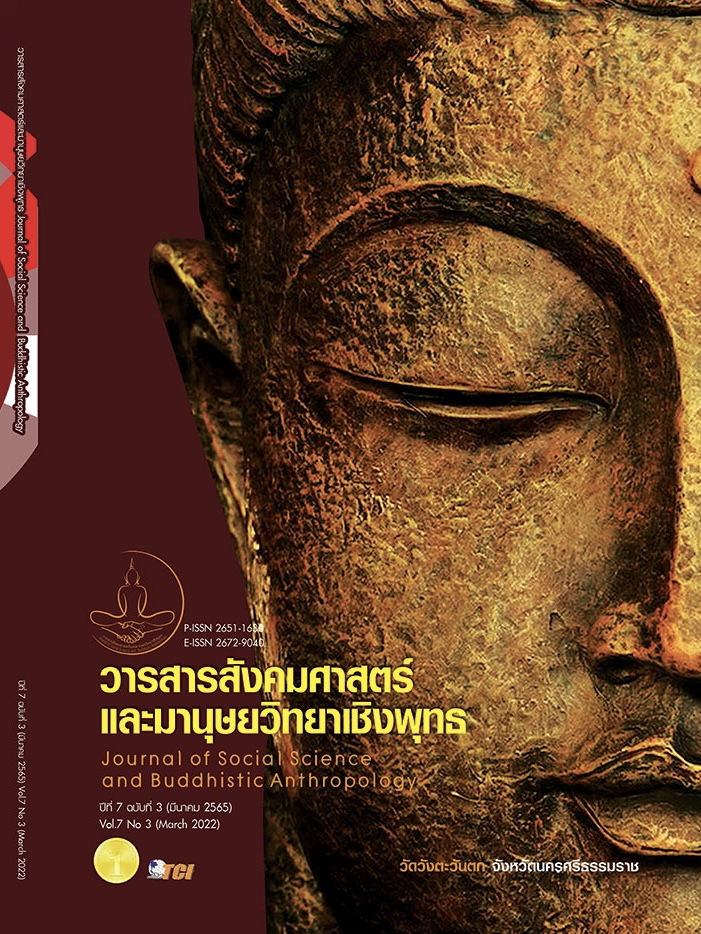STRATEGIES TO CREATE ADDED VALUE FOR ORGANIC PRODUCTS TO ENHANCE COMPETITIVENESS IN THE DIGITAL AGE
Keywords:
Strategies, Value Creation, Products, Organic Farming, Competitiveness in the Digital AgeAbstract
The objectives of this research article were to 1) study business conditions of organic farming product operators, and 2) study strategies to create value of organic farming products to enhance competitiveness in the digital age. The sample group were 10 interviewees who provided the essential data and 400 entrepreneurs of the organic farming groups who were respondents. The research instruments used were interview forms and questionnaires. The statistics used were frequency, percentage, mean, standard deviation and stepwise multiple regression analysis. The results of the research revealed that most organic farming groups, when considering the business conditions of organic farming product operators in general, did not create their own product brands. Most of them invested their own money into the business. Most customers were domestic consumers. The main problem found was the entrepreneurs had no standards approved. The average point of the importance of components for the entrepreneur's potential was at the highest level. The results of the study on strategies for value creation of organic farming products to enhance competitiveness in the digital age, it was found that 1) six strategies of the market management could predict the success of value creation of organic farming products to enhance competitiveness in the digital age at 94.60% accuracy, 2) seven strategies of the collaboration networks could predict the success of value creation of organic farming products to enhance competitiveness in the digital age at 95.90% accuracy, 3) six strategies of the innovation could predict the success of value creation of organic farming products to enhance competitiveness in the digital age at 91.20% accuracy, 4) four strategies of the entrepreneurs’ potential could predict the success of value creation of organic farming products to enhance competitiveness in the digital age at 83.10% accuracy.
References
กรมวิชาการเกษตร. (2562). จำนวนรายและพื้นที่เพาะปลูกเกษตรอินทรีย์ฐานข้อมูลเพื่อการรายงาน สถานการณ์คุณภาพสิ่งแวดล้อมของประเทศไทย. เรียกใช้เมื่อ 22 มีนาคม 2563 จาก https://www.onep.go.th/env_data/01_02/13-organic-agriculture/
กรมส่งเสริมการเกษตร. (2562). ความสำคัญของการสร้างมูลค่าเพิ่มสินค้าเกษตร. กรุงเทพมหานคร: กลุ่มส่งเสริมและพัฒนาผลิตภัณฑ์วิสาหกิจชุมชน.
กระทรวงพาณิชย์. (2562). มูลค่าของสินค้าเกษตรอินทรีย์ในตลาดโลก ศูนย์ปฏิบัติการข้อมูลการตลาดสินค้าเกษตรอินทรีย์. เรียกใช้เมื่อ 24 ธันวาคม 2562 จาก http://www. organic.moc.go.th/th/structure/role.
เกรียงศักดิ์ โชควรกุล. (2560). การพัฒนาเครือข่ายและยกระดับผลิตภัณฑ์เกษตร “พริก” เพื่อการส่งออกของจังหวัดนครราชสีมา และจังหวัดชัยภูมิ. วารสารธรรมทรรศน์, 17(3), 275-284.
ชนวน รัตนวราหะ. (2545). เกษตรอินทรีย์. นนทบุรี: กรมวิชาการเกษตร: สำนักวิจัยพัฒนา เทคโนโลยีชีวภาพ.
ธิดารัตน์ ไชยมงคล. (2556). เงื่อนไขที่สนับสนุนการพัฒนาเกษตรอินทรีย์ของเกษตรกรรายย่อยหมู่บ้านโพธิ์ทองเจริญ ตำบลเชิงดอย อำเภอดอยสะเก็ด จังหวัดเชียงใหม่. ใน วิทยานิพนธ์วิทยาศาสตรมหาบัณฑิต สาขาวิชาส่งเสริมการเกษตร. มหาวิทยาลัยเชียงใหม่.
ประภาพรรณ เหล่าวีระกุล. (2556). ปัจจัยที่มีผลต่อการผลิตข้าวหอมมะลิอินทรีย์ของ เกษตรกร ที่ผ่านมาตรฐานเกษตรอินทรีย์ในจังหวัดอุบลราชธานี. ใน วิทยานิพนธ์ วิทยาศาสตรมหาบัณฑิต สาขาวิชาส่งเสริมการเกษตร. มหาวิทยาลัยเชียงใหม่.
วิฑูรย์ ปัญญากุล. (2445). มาตรฐานเกษตรอินทรีย์. กรุงเทพมหานคร: มูลนิธิสายใยแผ่นดิน.
ศูนย์วิจัยกสิกรไทย. (2563). บทวิเคราะห์แนวโน้มธุรกิจ:เกษตรอินทรีย์ไทยโอกาสก้าวไกล...หากรัฐเร่งยกระดับมาตรฐานการผลิต. เรียกใช้เมื่อ 18 มีนาคม 2563 จาก https://www.kasikornresearch.com/th/analysis/k-econ/business/Pages/ 14345.aspx.
สำนักงานพัฒนาการวิจัยการเกษตร (องค์กรมหาชน). (2563). การทำเกษตรแปรรูปเพื่อเพิ่มมูลค่า สินค้า. เรียกใช้เมื่อ 18 มีนาคม 2563 จาก https://www.arda.or.th/ knowledge_detail.php?id=11
สำนักงานส่งเสริมวิสาหกิจขนาดกลางและขนาดย่อม. (2561). ชาวญี่ปุ่นกับการสร้างคุณค่าผลิตผลทางการเกษตร. งานพัฒนาองค์ความรู้สำหรับ SME (Knowledge Center). เรียกใช้เมื่อ 16 พฤษภาคม 2563 จาก http:angle.org/th/j-gourmet/agriculture-product- japan.html.
สุดใจ จงวรกิจวัฒนา. (2545). การศึกษาเศรษฐกิจการผลิตการตลาดพืชผักอินทรีย์. ใน ข่าวเศรษฐกิจ การเกษตร (หน้า 551(ตุลาคม) 6-14).
Adair, J. (2009). The art of creative thinking: How to be innovative and develop great ideas. London: Kogan Page.
Roopsing, T. & Suk-kavessako, T. (2020). The Structural Equation Model of Guidelines for Garment Industry Management for
Sustainability. Academy of Strategic Management Journal, 19(6), 1-15.
Su, C. C., & Ming, S. L. (2008). The linkage between knowledge accumulation capability and organizational innovation. Journal of Knowledge Management, 12(2008), 3-20.
Trott, P. (2012). Innovation Management and New Product Development. (4th ed.) New Jersey: Prentice Hall.
Downloads
Published
How to Cite
Issue
Section
License
Copyright (c) 2022 Journal of Social Science and Buddhistic Anthropology

This work is licensed under a Creative Commons Attribution-NonCommercial-NoDerivatives 4.0 International License.









